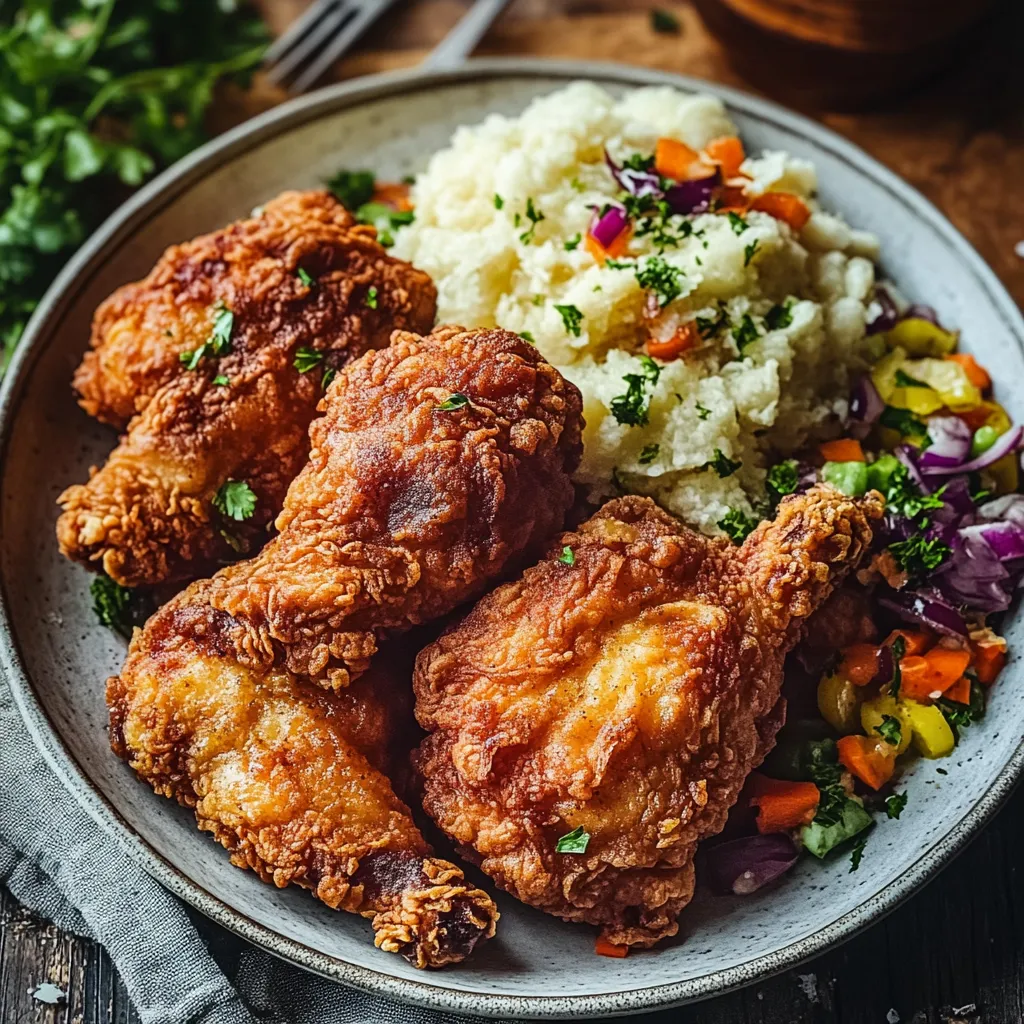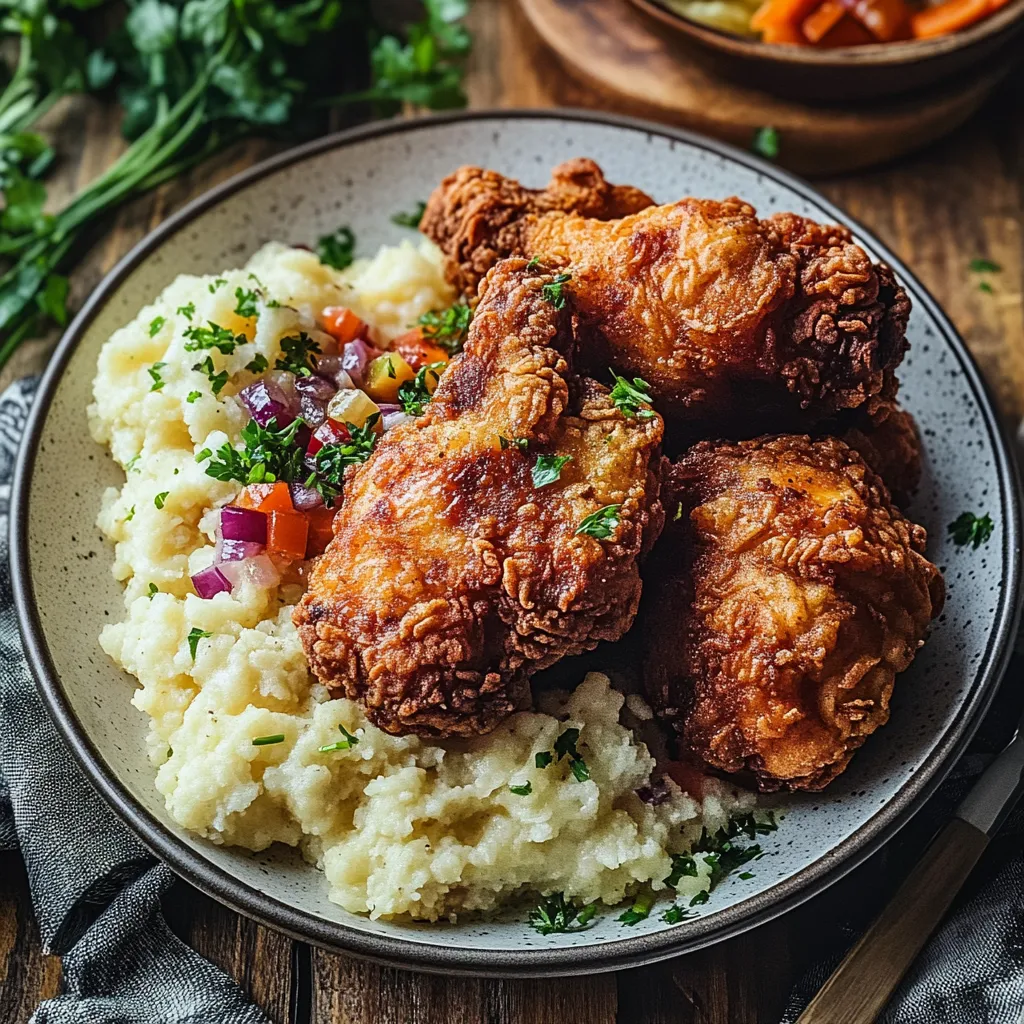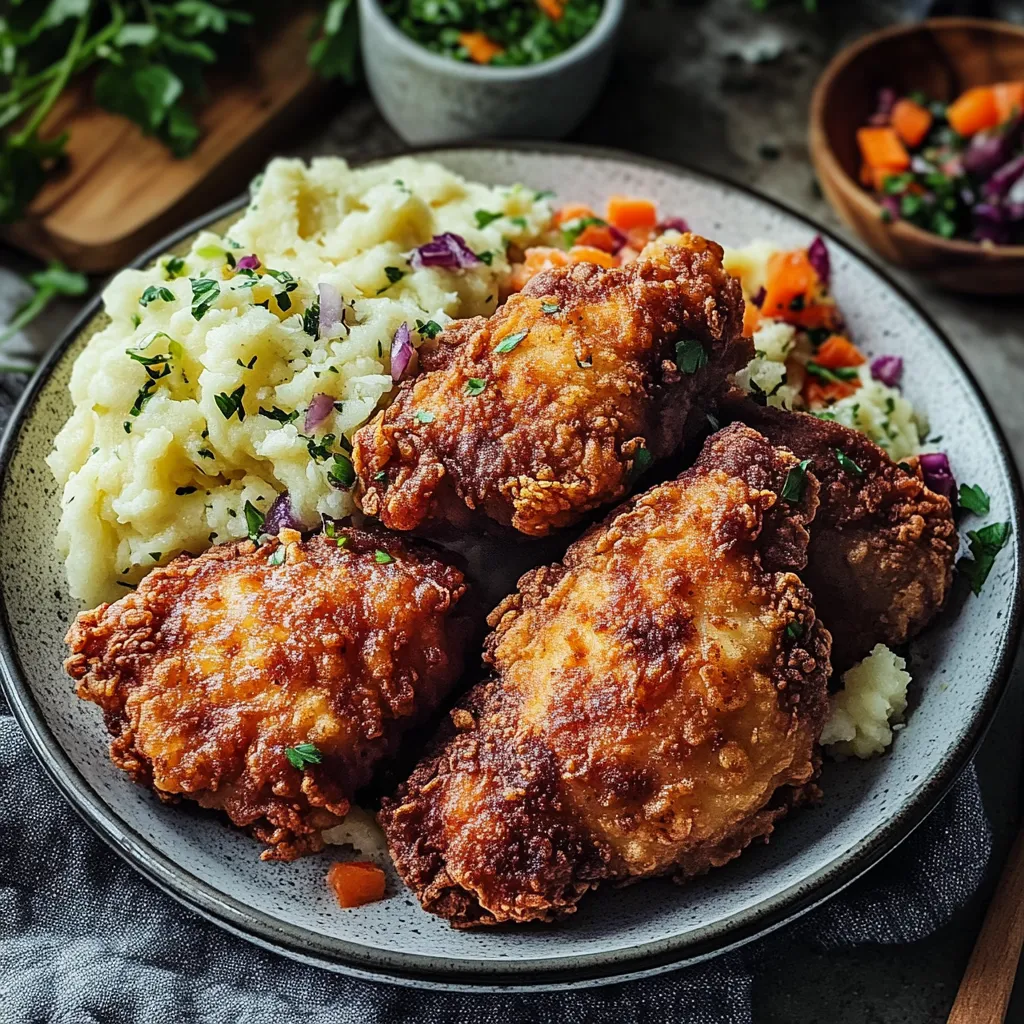 Pin it
Pin it
This chicken fried chicken recipe transforms humble chicken thighs into a crispy, golden delicacy that rivals any restaurant version. The secret lies in the buttermilk marinade that tenderizes the meat while the seasoned coating creates that perfect crunch we all crave.
I perfected this recipe during pandemic lockdowns when my family craved restaurant favorites. After numerous attempts, this version became our Sunday dinner tradition, with my children requesting it above all other meals.
Ingredients
- Bone-in, skin-on chicken thighs: Provide the juiciest results and won't dry out during frying
- Buttermilk: Works as a tenderizing marinade that helps the coating adhere perfectly
- Hot sauce: Adds subtle heat without overpowering the chicken flavor
- All-purpose flour: Creates the base for our crispy exterior
- Baking powder: The secret ingredient that ensures extra crispiness
- Garlic powder and onion powder: Provide savory depth without the burning that fresh garlic might cause
- Paprika: Adds beautiful color and mild sweetness to balance the coating
- Cayenne pepper: Brings adjustable heat that complements the richness of fried chicken
- Vegetable oil: Has the high smoke point necessary for perfect frying
Step-by-Step Instructions
- Marinate the Chicken:
- Place chicken thighs in buttermilk mixed with hot sauce, ensuring they're fully submerged. This acidic bath tenderizes the meat while infusing flavor. For truly spectacular results, let the chicken marinate overnight, though two hours will work in a pinch. The longer marinade creates chicken that practically falls off the bone after cooking.
- Prepare the Seasoned Coating:
- Whisk together flour, baking powder, and all seasonings until thoroughly combined. The baking powder creates tiny air bubbles during frying that result in an exceptionally crunchy exterior. Make sure to season generously as some flavor will be lost during cooking. I recommend tasting a pinch of the flour mixture to ensure it has enough salt and pepper.
- Heat the Oil Properly:
- Pour vegetable oil to a depth of one inch in your heaviest skillet or Dutch oven. The heavy bottom prevents hot spots that can burn the coating. Heat oil to exactly 350°F using a thermometer for precision. Too cool, and your chicken absorbs oil becoming greasy. Too hot, and the outside burns before the inside cooks through.
- Dredge With Purpose:
- Remove chicken from buttermilk, allowing excess to drip off for several seconds. Press chicken firmly into the seasoned flour, ensuring every nook and cranny is coated. For extra crispiness, let the coated chicken rest on a wire rack for five minutes before frying, which helps the coating adhere better.
- Fry With Patience:
- Lower chicken pieces carefully into the hot oil, placing them away from you to prevent splatter burns. Maintain oil temperature between 325°F and 350°F throughout cooking by adjusting heat as needed. Cook until deep golden brown, about 8 minutes per side, and internal temperature reaches 165°F. The coating should bubble actively but not violently during frying.
- Rest Before Serving:
- Place fried chicken on a wire rack, not paper towels, to maintain maximum crispiness. Let rest for 5 minutes to allow juices to redistribute throughout the meat and the exterior to set completely. This resting period is crucial for the perfect texture contrast between crispy exterior and juicy interior.
 Pin it
Pin it
This recipe reminds me of Sunday dinners at my grandmother's table in rural Georgia. She insisted on using cast iron skillets that had been seasoned for generations, claiming they infused extra flavor into the chicken. While any heavy-bottomed pan works well, I still use her cast iron pan when making this dish for my own family, keeping her tradition alive.
The Secret to Perfect Crispiness
The combination of buttermilk marinade and properly seasoned flour creates that distinctive crunchy coating that makes chicken fried chicken so irresistible. The acid in the buttermilk breaks down proteins in the chicken, resulting in tender meat, while also creating a surface that the flour mixture can cling to effectively. For even more texture, try double-dredging your chicken. After the first coat of flour, dip briefly back in buttermilk, then coat again with flour for an extra-thick, shatteringly crisp crust.
Serving Suggestions
Chicken fried chicken reaches its full potential when paired with classic Southern sides. Creamy mashed potatoes make the perfect bed for this crispy delight, especially when topped with country gravy made from the frying pan drippings. For textural contrast, serve with tangy coleslaw or vinegar-based cucumber salad. Hot buttermilk biscuits complete the meal, perfect for sopping up any remaining gravy. For a proper Southern experience, serve with sweet iced tea and finish with a slice of peach cobbler.
Troubleshooting Common Issues
Coating falls off during frying? Ensure your oil is properly heated before adding chicken. Cold oil causes the coating to absorb rather than instantly seal. Also, avoid moving the chicken too much during the first few minutes of frying when the crust is setting. Dark coating but undercooked chicken? Your oil temperature is too high. Lower the heat and consider finishing particularly thick pieces in a 350°F oven after frying. Greasy results typically indicate too-low oil temperature causing the coating to absorb oil rather than repel it. Always use a thermometer for precision.
 Pin it
Pin it
Enjoy your perfectly crispy chicken with all the comforting flavors of home.
Frequently Asked Questions
- → Can I use boneless chicken instead of bone-in thighs?
Yes, boneless chicken works well too. Reduce the cooking time by 2-3 minutes per side since boneless pieces cook faster. Just make sure the internal temperature reaches 165°F (74°C) for safe consumption.
- → How can I tell when the oil is at the right temperature without a thermometer?
If you don't have a thermometer, drop a small pinch of flour into the oil. If it sizzles immediately and rises to the top, the oil is ready. If it browns too quickly, the oil is too hot. If it sinks without much reaction, the oil needs more heating.
- → What can I substitute for buttermilk?
Make your own buttermilk substitute by adding 1 tablespoon of lemon juice or white vinegar to 1 cup of regular milk. Let it sit for 5-10 minutes until it slightly curdles. The acidity helps tenderize the chicken similar to buttermilk.
- → How can I keep the chicken warm while frying multiple batches?
Place finished chicken on a wire rack set over a baking sheet in a 250°F (120°C) oven. This keeps the chicken warm and crispy while you finish frying the remaining pieces.
- → Can this chicken be made ahead of time?
While best served fresh, you can fry the chicken up to 2 hours ahead. Keep it uncovered on a wire rack at room temperature for up to 1 hour, or in a 250°F oven for up to 2 hours to maintain crispiness. Reheat leftovers in a 375°F oven until heated through.
- → Is there a way to make this dish less spicy?
Absolutely! Simply omit the hot sauce from the marinade and reduce or eliminate the cayenne pepper in the flour mixture. The garlic powder, onion powder, and paprika will still provide plenty of flavor without the heat.
